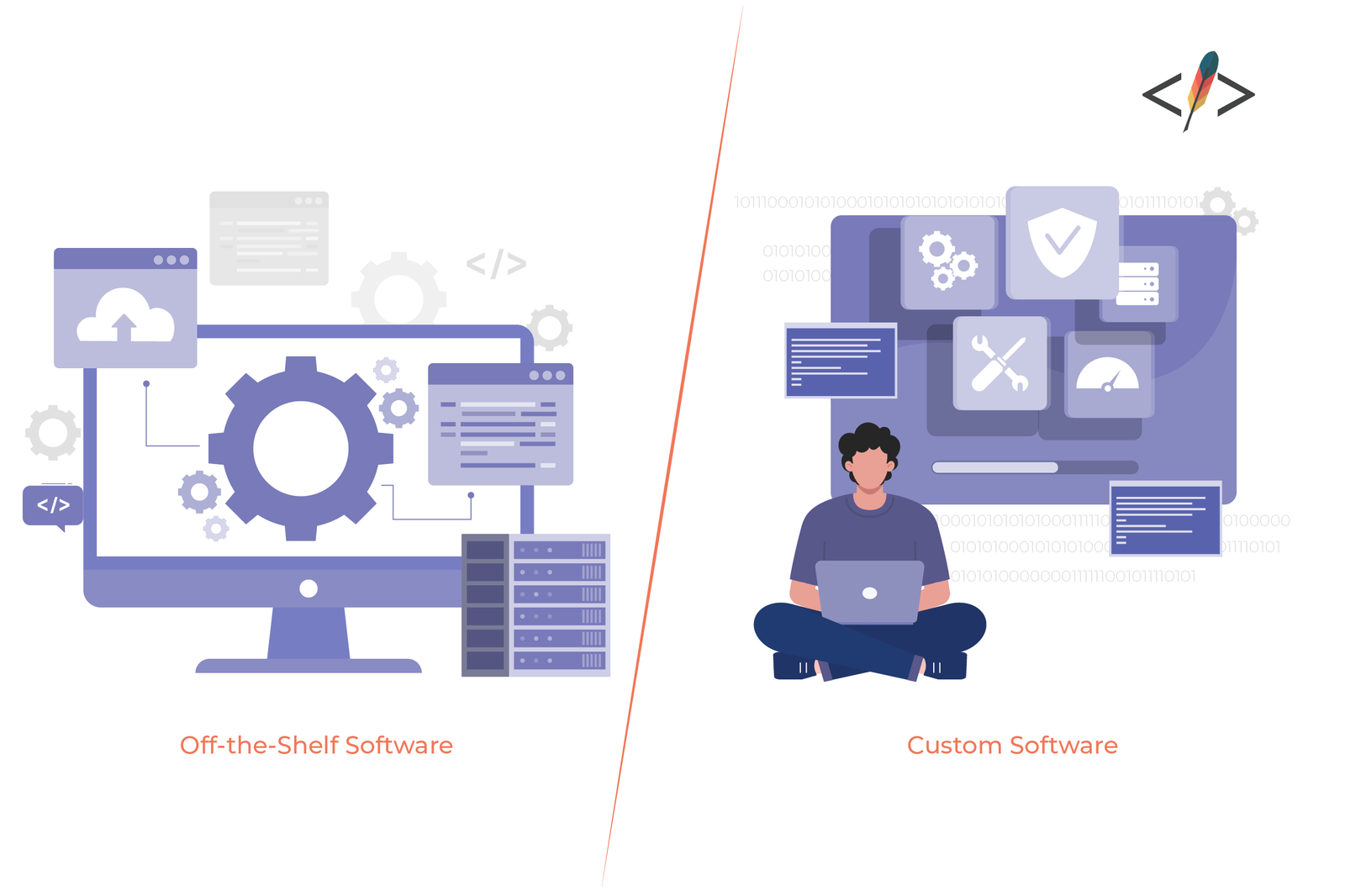

How to Choose Between Custom Software vs. Off-the-Shelf Software for Small Businesses
As technology advances, businesses must choose between bespoke solutions and off-the-shelf software, impacting growth and longevity. Custom software offers six benefits: adaptability, cost-effectiveness, efficiency, data-driven decision-making, improved customer experience, and heightened security. This article examines popular off-the-shelf software pros and cons compared to custom solutions. Off-the-shelf software is ready-made but less tailored, while custom software, though initially costlier and time-consuming, offers scalability, flexibility, and better integration with specific business needs.

As technology rapidly develops in scope and capability, business owners are experiencing the value of implementing robust, comprehensive software solutions into their core workflows. However, the critical choice between bespoke solutions and off-the-shelf software can profoundly affect a company's growth and longevity.
We recently explored six reasons why small businesses benefit from choosing custom software development: adaptability, cost-effectiveness, enhanced efficiency, data-driven decision-making, improved customer experience, and heightened security.
This article will examine the topic further, reviewing the pros and cons of the most popular off-the-shelf software types that small businesses use. We'll then compare those options to custom software solutions so you can make the most informed, advantageous decision for your business.
What is Off-the-Shelf Software
Off-the-shelf software refers to any standardized application developed for commercial use, sold on a mass market, and targeted to a broad base of users. Often called "out-of-the-box" software, these solutions are ready-made products that offer virtually instant usability.
Off-the-shelf software caters to business operations in almost every major industry, including fin-tech, marketing, healthcare, food and beverage, agriculture, art, entertainment, automotive, fashion, manufacturing, distribution, and more. However, with generic features that appeal to a broad audience, off-the-shelf solutions are not customized to fit a specific business's precise needs.
Off-the-Shelf Software Examples
Many business owners already utilize off-the-shelf software within company operations and in their personal lives. Here are some of the most popular off-the-shelf software examples:
Zoom
Zoom has skyrocketed in popularity in the past few years as a tool for connecting with friends, family, colleagues, and customers. In line with the rising favor of remote work, Zoom Workplace facilitates more meaningful dialogues and elevated productivity among hybrid work teams.
What Users Say: While Zoom is a helpful tool for connecting on a personal level, many TrustPilot users find fault with the software's professional capabilities and less-than-helpful customer service.
Salesforce
Primarily utilized by service teams, Salesforce Service Cloud streamlines customer support, enabling self-service options, efficient points of contact, AI/chatbot capabilities, and more.
What Users Say: According to G2.com, this off-the-shelf software is user-friendly and intuitive. However, the licensing costs for each service agent and fees for some add-on features quickly add up.
QuickBooks
QuickBooks is a popular software package for managing accounting, income, inventory, expenses, taxes, and more for both personal use and small- to medium-sized businesses.
What Users Say: QuickBooks users often appreciate the multitude of features, but some have found the software lacking usability and support.
Microsoft Outlook
Most often recognized as a corporate email box, Microsoft Outlook helps users organize their work, group, and personal lives using an integrated email/calendar/task information manager.
What Users Say: Techradar.com reports that many users appreciate Outlook's security and user-friendliness but wish the software had additional customizations, more third-party integrations, and extra features.
Asana
As a web and mobile solution, Asana facilitates seamless connections between business departments, streamlining task management and project organization.
What Users Say: While Asana is packed with robust features—including unique project views, helpful process automation, and AI—some users warn of a steep learning curve and difficult navigation.
Custom Software Benefits
Unlike out-of-the-box software, which is similar to taking a one-size-fits-all approach, bespoke software solutions are meticulously crafted to solve the pain points and meet the nuanced needs of one specific organization.
The process of custom software development begins with a comprehensive research and requirement-gathering stage, followed by careful planning and architecting of the potential software project. As such, custom software is conceived and created 100% with the client's needs and goals at the forefront, resulting in a seamlessly integrated, robust system without any faults.
Custom Software Examples
The automated reporting tools for Blue Hawaiian Helicopters improved productivity by over 50%.
Patient care portals created and used by hospitals and health providers fit the needs of specific industry subsets.
Expandable franchise business tools for Intelligent Office facilitate the unique growth needs the company couldn't meet otherwise.
Secure, user-friendly banking apps are developed by and for financial institutions to offer customized, seamless support.
Flight scheduling and crew management software custom-built for Delta Air Lines helped to streamline internal and external processes.
The store locator website feature and iOS app for Account Service Representatives at Rug Doctor reduced costs by $2950 per rep.
Ordering, navigation, and delivery management of popular food apps like Uber Eats use custom software to balance complex needs at multiple touchpoints.
Understanding the Differences: Off-the-Shelf Software vs. Custom Software Development Services
The proper software can enable growth and foster scalability within an organization. However, as with any investment, its success is contingent on carefully considering the advantages and disadvantages first.
Off-the-Shelf Software Advantages and Disadvantages at a Glance:
Advantages of Off-the-Shelf Software:
Quick Timeline—You can immediately implement and use most off-the-shelf software. Simply buy it and get started.
Broad Usability—Created to appeal to an expansive audience, off-the-shelf products are usually user-friendly and easy to navigate.
Regular Updates—Most software is regularly updated for security and the occasional addition of new features. (However, see discontinuation disadvantage.)
Cost (Initial)—Commercial software is generally cheaper to buy initially. (However, see disadvantages.)
Disadvantages of Off-the-Shelf Software:
Limited Scalability—Scaling with commercial software often includes purchasing add-ons or more features, and the software may not be compatible with future tech stack integrations.
Confusing Features—Software designed to appeal to a broad audience is often packed with more features than a user needs, creating a clunky, confusing user experience.
No Customization—Unlike custom code, changing the features of off-the-shelf software isn't usually possible.
Discontinuation Risk—Business owners risk utilizing software for core competencies that they don't own. The creators of the out-of-the-box software may choose to discontinue or end support for a product at any time.
Costs (Hidden & Long-Term)—Commercial software costs can add up as a business grows and requires more licenses, user permissions, or features. A lack of features may also require additional software, which eats into profit.
Custom Software Advantages and Disadvantages at a Glance:
Advantages of Custom Software:
Scalable—Custom software is developed to meet the needs of an organization and factors growth goals into account.
Highly Flexible—Developers often can implement changes and updates that aren't possible with off-the-shelf software.
Customizable—Custom development results in tailored software that meets an organization's precise requirements and doesn't include any unneeded features that “weigh down” users.
Competitive Edge—Bespoke solutions give customer-centric software a competitive advantage, including unique features and branded UI/UX.
Ownership—A business owner can feel confident owning the software (according to the agreement with the development firm), eliminating the worry of unsupported software becoming obsolete.
Efficient Usability—Custom software can integrate with a current ecosystem and streamline the processes that are unique to a specific business, fostering internal efficiency.
Cost (Long-Term)—Custom software has a high ROI when considering the significance of the advantages above.
Disadvantages of Custom Software:
Longer Timeline—Custom software takes longer to implement since it is developed from "the ground up," rather than purchased in an already-completed stage.
Hired Risk—Hiring the wrong firm in an effort to reduce development expenses can cost more in the long term.
Cost (Initial)—The initial investment in custom software development is higher because of the time and expertise it takes to plan, design, and create.
Custom Software for Local Business with Codepoet
If you're a business owner, it's critical that you consider your company's software needs in the long term. For some organizations, off-the-shelf software does the trick. Other businesses flourish only after they ditch their commercial products and implement a robust, custom-designed software solution.
At Codepoet, we're happy to help you determine what your organization needs to thrive. We're more than a development firm—we're your technology partners, here to make running a business easier. Reach out today for a free consultation.



